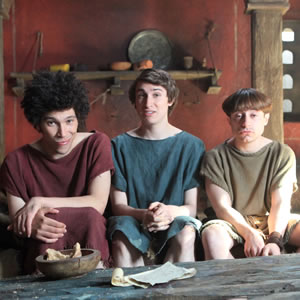28 Days Later... Day 7: Stephen Keyworth
Friday 7th February 2014
A Caffeine Drinker's Guide To Comedy or Your Script Isn't Funny Yet

I've had way too much coffee to organise my thoughts into something tidy and coherent. But these are my personal guidelines for writing comedy, or at least the ones I can remember through the loud buzzing in my ears:
- I was on the BBC Writers Academy under John Yorke, a thirteen week course on structure and storytelling. The main points you can read about in his book Into The Woods. Lots of rules about how to write story, but the get-out clause that lets you throw out all of these is: 'unless it's funny'. Funny is king.
- The main thing you should know is your script is not funny enough yet. That line you're worried isn't working? It isn't. Go back and make it better. Make them all better. Listen to your doubts. You need three good laughs on a page. At least. Get some friends together and do a reading, if you don't have friends use strangers or pay some homeless people. Make a tick every time you get a laugh or smile. Not enough ticks then this isn't a comedy script yet.
- Is this character funny? What are their rules of how they behave and what kind of jokes are you getting from them? Are they different from the jokes you get from other characters? Are they an engine for comedy? Can you write their voice without blood coming from your ears?
- Is this scene funny? Is it original or have you seen something like it on another show? Is there anything in the way of your character getting what they want? Why not for god's sake? No-one wants to watch someone getting what they want. Make it as difficult for your character as you possibly can. My favourite comedy scene in anything is the Curb Your Enthusiasm episode which builds to an argument at a party between a friend of Larry's father, who was in a concentration camp, and a game-show contestant about which of them is the best survivor. Or possibly the scene in Peep Show where Jeremy has to eat a barbecued dog. Family reunions, job interviews, first dates, we've seen so many of these. Can you give the scene an extra twist?

- Structure. Basically, does one thing lead to another? Are your characters doomed by their own actions? There's hardly ever a good excuse for using coincidence. There must be action, so keep your characters busy. Even in those scenes in Seinfeld where everyone sits around chatting there is conflict, and the churn of story moving forward, trivial though it is.
- My last rule is 'suck it up and move on'. I wrote a sitcom set in the Roman Coliseum. It did the rounds and I got lots of great feedback but I was told that no-one is making historical comedy. Now we have Plebs (pictured). There is no link, there is no conspiracy, there are no predatory producer equivalents of the Child Catcher creeping around with a big net collecting up other people's ideas. Sometimes two people come up with the same idea. So don't sit about getting drunk and maudlin while listening to power ballads, move on and come up with a new idea. Which is what I'm trying to do at the moment. More coffee.
Stephen Keyworth has written for EastEnders, Doctors and Casualty, and written comedy pilots for BBC Comedy, Leopardrama and Bayamber. In 2011 he won the Shine Pictures Big Idea feature film prize. Forthcoming credits for BBC Radio 4 include Making The Best Of It and The Two Georges.

